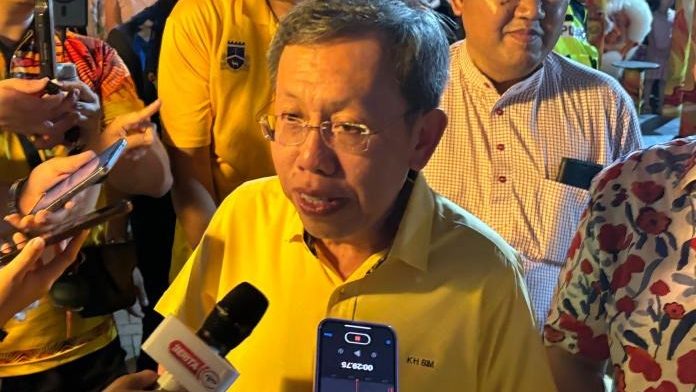Only Fair for Putrajaya to Invest Heavily in Sarawak’s Development, Says Deputy Premier

Sarawak’s Call for Fair Development Funding from Federal Government
KUCHING, Sept 18 – Sarawak’s Deputy Premier Datuk Amar Dr Sim Kui Hian has emphasized the urgent need for the Federal government to invest heavily in the state’s development, particularly in healthcare. During the Mid-Autumn Festival 2024 celebration at the Malaysia-China Friendship Park on Sept 17, Dr Sim pointed out that Sarawak has been lagging behind in infrastructure and healthcare facilities, and it’s only fair that Putrajaya takes significant steps to address this disparity.
Sarawak’s Healthcare Crisis: 70% of Clinics Dilapidated
One of the most pressing issues highlighted by Dr Sim was the alarming state of Sarawak’s healthcare system. According to him, 269 clinics in Sarawak are dilapidated, which accounts for a staggering 70% of the total number of clinics in the state. In contrast, Peninsular Malaysia does not face this level of healthcare facility degradation.
“Why does Peninsular Malaysia not have 70% dilapidated clinics? Why only Sarawak?” asked Dr Sim, expressing the deep-rooted concerns of Sarawakians.
He added that the state needs more allocations from the Federal government to address this severe backlog and ensure that Sarawak catches up with the rest of the country.
Prime Minister’s Announcement: Doubling the Special Annual Grants
In light of these concerns, there is a glimmer of hope. Dr Sim expressed his gratitude for Prime Minister Dato Seri Anwar Ibrahim’s recent announcement, which promised to double the special annual grants for both Sarawak and Sabah. Under Article 112D of the Federal Constitution, the annual grants for the two East Malaysian states will increase from an interim of RM300 million to RM600 million.
This doubling of the grant is a step forward in recognizing Sarawak and Sabah’s rights under the Malaysia Agreement 1963 (MA63). The special annual grants, which were meant to be reviewed every five years, had been halted since 1969.
The Long Fight for Sarawak’s Entitlements
The last review of Sarawak’s annual grant occurred in 1969, where the state was allocated a mere RM16 million per annum, while Sabah received RM26.7 million. However, since then, both states have seen almost no increase in these critical funds.
Dr Sim noted that Sarawak never protested this lack of funding due to the political climate at the time, particularly the Internal Security Act 1960, which made it challenging for the state to voice its concerns.
“Can you imagine that since 1969, they didn’t give us the money? Do they think that the accumulated total is just more than RM600 million?” Dr Sim asked, pointing out the long-standing injustice that Sarawak has faced.
The Prime Minister’s interim allocation of RM300 million for both Sabah and Sarawak in Budget 2024 was a significant move, but more needs to be done to catch up with over 50 years of underfunding.
Urgent Need for Healthcare Equipment: Dialysis Machines for Sarawak
Apart from dilapidated clinics, Sarawak faces a shortage of critical healthcare equipment, particularly dialysis machines. Dr Sim stressed that the state needs at least 50 new dialysis machines every year to cater to the growing number of kidney patients.
“Without dialysis, the patients die within days. With dialysis, they get to live another 15 to 20 years,” he said, highlighting the dire consequences of insufficient healthcare resources in Sarawak.
This shortage is just one example of the healthcare challenges that Sarawak faces, and it underscores the need for the Federal government to prioritize funding for the state’s healthcare infrastructure.
A Fair Call for Equitable Development
Sarawak’s plea for more significant investments from the Federal government is not merely about catching up; it’s about ensuring basic healthcare rights for its people. The state has been neglected for too long, and it’s time for Putrajaya to take meaningful action to rectify these longstanding issues.
The announcement of increased grants under MA63 is a welcome development, but the fight for Sarawak’s fair share is far from over. For Sarawakians, this is not just about money – it’s about ensuring a better future for generations to come.

